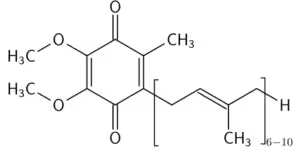Table of Contents
Coenzyme Q10 (CoQ10) (2,3-dimethoxy-5-methyl-6-decaprenyl-1,4-benzoquinone) is a natural antioxidant synthesized by your body. It’s also known as “ubiquinone” because it is ‘ubiquitous’ in the human body. CoQ10 is used by every single cell.
CoQ10 is required for the energy production that takes place in your mitochondria . It takes fat and other substances and converts them into usable energy.
Brain cells have a higher concentration of mitochondria than most other cells in your body. These mitochondria are like little power plants inside each cell. They even have their own DNA.
The source of life and death for neurons lies in mitochondria. Without healthy mitochondria, the natural function of each cell is damaged. And the life of that cell can come to a premature end.
CoQ10 is also a powerful antioxidant. And helps protect your cells from free radical (oxidative) damage. Free radicals are oxygen atoms missing electrons. This makes them highly reactive which wreaks havoc in your tissues and DNA.
Research shows CoQ10 prevents oxidative damage in your brain. Protecting the health of your brain cells.[i]
Coenzyme Q10 helps:
- Protect brain cells. Mitochondria generate the neuron’s energy and control its death. CoQ10 protects mitochondria from oxidative damage and dysfunction.
- Brain energy. CoQ10 assists with ATP fuel production in mitochondria. Low levels of CoQ10 results in brain fog, slow mental processing, and cognitive decline.
- Neurotransmitters. Brain nerve cells (neurons) provide electrical signals transmitting information between neurons. This neural signaling is involved in memory, learning, cognition and recall. CoQ10 contributes to the energy production in mitochondria in each of these neurons. Keeping them functioning optimally for normal brain processing.
Overview

Coenzyme Q10 (CoQ10) is a natural enzyme synthesized in your body. It’s also known as “ubiquinone” because it is ‘ubiquitous’ in the human body. CoQ10 is used by every single cell.
Your body uses CoQ10 faster than it can produce it. So you need supplemental CoQ10 either from food or a supplement. You can get CoQ10 from eating fatty fish, beef, poultry, nuts, seeds and oils.
CoQ10 assists with ATP production that take place within mitochondria in each of your brain cells. Mitochondria are the tiny power plants that are the most fundamental source of cellular energy production. And your brain has a higher concentration of mitochondria in each cell than most other organs.
CoQ10 is also a powerful antioxidant. It protects your cells from free radical damage. Oxidative damage has been implicated in several neurodegenerative diseases including Alzheimer’s, Parkinson’s, Huntington’s, and Lou Gehrig (ALS) disease.[ii]
Coenzyme Q10 is used throughout your body. It helps produce more energy for your cells, boosts heart health, helps maintain healthy blood pressure and immune system, and reduces the signs of aging.
Here we’re talking about how CoQ10 affects your brain health and chemistry.
CoQ10: Ubiquinone vs. Ubiquinol: What’s the Difference?
Coenzyme Q10 (CoQ10) is a fat-soluble nutrient produced naturally in your body. The highest concentration of CoQ10 is in the organs that require the most energy – including your heart, liver, muscles, kidneys and brain.
CoQ10 is in the mitochondria in your cells. This is where cellular energy occurs. It acts as an electron acceptor or donor in the chain of reactions that lead to cellular energy production.
When oxidized CoQ10 (ubiquinone) accepts an electron from another molecule in the chain, it becomes Ubiquinol. And when Ubiquinol donates an electron it becomes ubiquinone. This state of equilibrium is necessary and how your body benefits from CoQ10.
The chemical difference between ubiquinone and Ubiquinol is the Ubiquinol compound contains two hydroxyl groups. This makes it more “hydrophilic”, or easier to dissolve in water. And makes it more bioavailable than ubiquinone.[iii]
In Ubiquinol-form, CoQ10 has the ability to scavenge free radicals in the mitochondria and cell membranes. Sites where free radicals inflict the most damage.
Supplement makers have been offering various forms of CoQ10 claiming to enhance bioavailability. But absorption rates vary a lot from person to person. With some people only absorbing and utilizing extremely small amounts of CoQ10.
One company, BioActives® LLC has developed a new delivery mechanism for CoQ10 using a natural compound (beta-cyclodextrin) made from potato starch. MicroActive® Q10 is a free-flowing powder with enhanced bioavailability.
Research shows that daily use of MicroActive® Q10 doubles serum (blood) levels of CoQ10 in just 3 weeks.
You can get MicroActive Q10 in the new Performance Lab® Energy formula that also contains Acetyl-L-Carnitine, R-Lipoic Acid, PQQ and BioPerine for even better bioavailability.
How does CoQ10 work in the brain?
Coenzyme Q10 boosts brain health in several ways. But two in particular stand out.
- When you supplement with enough CoQ10, you’re giving your brain cells the fuel it needs to produce adenosine triphosphate (ATP). ATP is the fuel produced by the mitochondria in your neurons.
Mitochondria are the source of life and death for neurons. They generate your neuron’s energy and control its death. But mitochondria tend to develop defects as we age.
As these defects accumulate, mitochondria start to malfunction. This results in a reduction in cellular energy production. And cells die.
The result of this dysfunction can be brain fog, cognition problems, poor memory and recall. And ultimately neurodegenerative diseases like Alzheimer’s, Huntington’s, stroke and others.[iv]
Studies show that CoQ10 protects against this cellular damage by raising energy levels. In a study with rats, scientists put CoQ10 in their chow for 10 days before giving them a toxin that caused brain lesions. CoQ10 reduced lesions by 30%. And restored energy production in neurons to nearly normal levels.[v]
- CoQ10 preserves brain function, mental illness and fights migraines. CoQ10 is essential not only in preventing brain deterioration at a structural level, but in maintaining normal function at all ages.
Studies are beginning to show some troubling associations between migraine headaches and mental health issues like depression and schizophrenia.
 Scientists don’t know for sure what causes migraines. But think it may be related to brain energy levels. Studies show that CoQ10 supplementation in children, adolescents and adults had significant decreases in frequency and length of migraines.[vi]
Scientists don’t know for sure what causes migraines. But think it may be related to brain energy levels. Studies show that CoQ10 supplementation in children, adolescents and adults had significant decreases in frequency and length of migraines.[vi]
Major depression, bipolar disorder and schizophrenia have long been considered separate health issues. Lately, they are being recognized as having mitochondrial dysfunction in common. And higher oxidative stress levels.[vii]
Just one of many studies show that depression in older bipolar adults had a significant reduction in symptoms. This was after treatment with 1,200 mg of CoQ10 per day.[viii]
How things go bad
As we get older, the chemistry in our brain cells and energy metabolism changes.
↓ Brain cell membranes degenerate
↓ Recall, reaction time and mood diminish
↓ Neurotransmitter levels decline
All of these age-related changes are contributing factors to the neurodegenerative diseases of aging, including Alzheimer’s and dementia.
But even if things haven’t degenerated to such a debilitating level, CoQ10 can help.
CoQ10 benefits
Research from thousands of studies have shown that Coenzyme Q10 will:
- Boost energy levels and stamina
- Reduce fatigue

- Reduce the possibility of age-related diseases
- Lower blood pressure
- Lower blood sugar levels
- Provide protection and energy to your brain
- Boost cerebral blood flow
How does CoQ10 feel?
Optimizing your mitochondria is one the most powerful strategies you have to extend your life. Mitochondrial dysfunction is associated with the aging process, including many age-related diseases.
So when taking CoQ10 you should feel better and more energized. Thinking should be clearer. Less fatigue and stamina improved.
Some neurohackers report feeling more fatigue while taking Ubiquinol. And actually feel better taking the less optimized form ubiquinone.
CoQ10 Clinical Research
CoQ10 was first isolated from beef hearts at the University of Wisconsin in 1957. Research continued at Merck & Company, Stanford Research Institute, and the University of Texas at Austin. Many studies from around the world have been published since.[ix]
CoQ10 can Improve Learning
A study at the University of Texas was conducted to find out if supplementing with CoQ10 or Vitamin E could help older mice learn tasks more quickly. The researchers separated groups of older mice. And gave each mouse either CoQ10, Vitamin E, or both antioxidants for 14 weeks.
The mice were run through a battery of tests assessing learning, memory and psychomotor function. The study concluded that CoQ10 combined with Vitamin E working in concert boosted performance in all tests.[x]
CoQ10 for Parkinson’s Disease
Neuron death caused by oxidative stress is implicated in a host of neurodegenerative diseases. Including Alzheimer’s, Parkinson’s and stroke.
Oxidative stress is an imbalance between the production of free radicals, and the ability of your body to detoxify the harm caused by free radicals. Exposure to toxins in your everyday environment can cause oxidative stress.
Researchers at the University of California, San Diego set out to determine if supplementing with CoQ10 could slow the progression of Parkinson’s Disease.
80 patients with Parkinson’s Disease were assigned CoQ10 dosages of 300, 600, or 1200 mg daily. The patients underwent evaluation with the Unified Parkinson Disease Rating Scale (UPDRS) at the screening, baseline, and 1-, 4-, 8-, 12-, and 16-month visits.
The research team concluded, “ Coenzyme Q10 was safe and well tolerated at dosages of up to 1200 mg/d. Less disability developed in subjects assigned to coenzyme Q10 than in those assigned to placebo, and the benefit was greatest in subjects receiving the highest dosage. Coenzyme Q10 appears to slow the progressive deterioration of function in Parkinson’s Disease”.[xi]
CoQ10 Reverses Gulf War Illness
The profound protective effect of CoQ10 on brain neurons and memory was proven in studies with soldiers who fought in the Persian Gulf War.
About one-third of the 700,000 troops deployed during the first Persian Gulf War, have been diagnosed with Gulf War Illness (GWI). Symptoms include fatigue, muscle pain, weakness, and decreased cognitive function.
 Gulf War Illness was caused by exposure to pesticides, sarin nerve gas, and other toxins during the war.
Gulf War Illness was caused by exposure to pesticides, sarin nerve gas, and other toxins during the war.
Forty-six United States Gulf War veterans participated in this randomized, double-blind, placebo-controlled study. All had been diagnosed with GWI.
The veterans were given CoQ10 in pill form, or a placebo for 3 ½ months. Researchers concluded that 80% of those receiving only 100 mg of CoQ10 during this study saw improvements with headaches, irritability, recall and muscle pain.
The degree of improvement correlated to the degree in which CoQ10 levels in the blood increased.[xii]
CoQ10 Recommended Dosage
CoQ10 can help the synthesis of ATP within mitochondria in your brain, and throughout your body. It reduces oxidative stress and damage to mitochondria. Helping to slow the aging process.
Dosing CoQ10 depends on what you’re trying to accomplish. Generally dosing for a healthy adult is 30 – 400 mg daily.
- As an antioxidant: 60 – 150 mg daily
- Muscle control problems: 300 – 3,000 mg daily
- Alzheimer’s Disease: 400 mg daily
- Heart Attack recovery: 30 – 600 mg daily
- To prevent heart disease: 200 mg daily
- Chemotherapy side effects: 50 – 90 mg daily
- Improve exercise performance: 50 – 300 mg daily
- Male infertility and Peyronie’s disease: 30 – 300 mg daily
- Diabetic nerve pain: 400 mg daily
- Weight loss: 100 mg daily
- Parkinson’s Disease 1,200 mg daily
Note: recommended dosing is for as long as you have symptoms. Work with your doctor and get tested for CoQ10 levels in your blood. Once your CoQ10 level are optimized you can scale back to a maintenance dose.
CoQ10 Side Effects
The primary “side effect” of using CoQ10 in your nootropic stack is – you’ll feel better. You should have more energy and thinking should be clearer and faster.
CoQ10 may reduce the toxic effect of some chemotherapy drugs. And it may enhance the effectiveness of some blood pressure medications. Which can be good or bad depending on your situation.
CoQ10 can reduce the efficacy of a blood thinner like Warfarin. It can also lower blood sugar levels. So needs to be monitored if you have diabetes.
Caution is advised when using CoQ10 with aspirin. Especially if you have a bleeding disorder.
Talk to your doctor if you’re on any medication before you start using CoQ10.
A few people who use CoQ10 report rashes, nausea, abdominal pain, dizziness, sensitivity to light, irritability, headache, heartburn or fatigue.
Some neurohackers say they feel fatigue when using Ubiquinol but not with the less expensive Ubiquinone. Experiment and see what works best for you.
Type of CoQ10 to Buy
There are two types of CoQ10 used in CoQ10 supplements: ubiquinone and Ubiquinol. Some alternative health practitioners advise staying away from ubiquinone because your body has to convert it to Ubiquinol to use it.
If you’re under 25 and in good health you can likely get the benefit of CoQ10 with the less expensive ubiquinone. Over 25 and you’re better off with Ubiquinol.
Ubiquinol is identical to 95% of the CoQ10 your body is designed to naturally produce. Which means your body doesn’t have to convert the CoQ10 to use it.
BioActives® LLC has developed a new delivery mechanism for CoQ10 using a natural compound (beta-cyclodextrin) made from potato starch. MicroActive® Q10 is a free-flowing powder with enhanced bioavailability.
In 2011, a study published in the Journal of Evidence-Based Integrative Medicine showed that daily use of MicroActive® Q10 doubles serum (blood) levels of CoQ10 in just 3 weeks.
You can get MicroActive Q10 in the Click for Performance Lab® Energy formula that also contains Acetyl-L-Carnitine, R-Lipoic Acid, PQQ and BioPerine for even better bioavailability.
Nootropics Expert Recommendation
Coenzyme Q10 200 – 400 mg per pay
 I recommend using CoQ10 as a nootropic supplement.
I recommend using CoQ10 as a nootropic supplement.
Your body does make some CoQ10 on its own. And from the food you eat. But studies have shown we don’t get an adequate supply of CoQ10 from food sources in our diet.
CoQ10 is especially helpful for those suffering from age-related cognitive decline. Studies show it helps stop or reverse brain degeneration with Alzheimer’s Disease, and slow the progression of Parkinson’s Disease. Especially in the early stage of the disease.
CoQ10 is particularly effective for boosting energy levels in those with low levels of CoQ10.
I now get my CoQ10 from the Click for Performance Lab® Energy formula that contains MicroActive® Q10, Acetyl-l-Carnitine (ALCAR), BioPQQ® and BioPerine®.
We suggest starting with a dose of 200 mg daily. And CoQ10 is a great compliment to a stack including any nootropic.
You need to provide your brain mitochondria with the ingredients needed for ATP production. ATP is your source of cellular energy. Or neurons start to break down from the inside. Signs that your lacking adequate CoQ10 is brain fog, slow thinking, headaches and muscle aches.
Age-related cognitive disorders that include muscle control problems may want to up the dose to 3,000 mg per day. But for a limited time until CoQ10 blood levels are stabilized. Work with your doctor.








Join The Discussion - 88 comments
sander
May 29, 2024
Hi David! Regarding Q10 MicroActive, do you think it would be better if I split the dose more times a day or can I take it all at once? thank you again!
David Tomen
May 31, 2024
Sander, it is fat soluble to you can take your dose all at once. Because the unused portion will be stored in fat cells until needed.
Ryan Smith
April 16, 2024
Another great article, thank you
What are you thoughts on the below linked CoQ10?
Quality of Life MicroActive CoQ10-SR
David Tomen
April 22, 2024
Ryan, I have never heard of that company but that is the same patented from of CoQ10 that Performance Lab uses in their Energy supplement: https://bit.ly/3ifR1XJ
hakan
February 13, 2024
Hi david im trying to recover from an extreme burnout, would u say 30 mg of q10 ubiquinone is enough to take daily or do i need a higher dose?
David Tomen
February 13, 2024
Hakan, you likely need at least 100 mg CoQ10 per day. But it really depends on your unique system and what it needs. You can ask your doctor to test your CoQ10 levels as well.
derek
April 13, 2023
Hello david. I’m all for branded ingredients and so I wanted to get your opinion on the Kaneka brand of q10. They are the pioneers of coq10 with lots and lots of studies dating back to the 70’s and from what I understand the only q10 made in the usa,(maybe that has changed?) How well do you think the microactiveq10 compares to Kaneka q10? I’m sure the delivery method is superior to most but from my research Kaneka may have the best raw material which has to mean something. What are your thoughts? Thanks in advance!
David Tomen
April 18, 2023
Derek, I prefer supplements that contain patented ingredients because the dietary supplement company must pay a licensing fee to the inventor/supplier of that ingredient. The supplement is often more expensive because of that but I know that what is says on the label is in the capsule. Once I verify it is a trustworthy company to start with and they are using misleading labels. Which would not last long before the lawyers got involved.
But once I verify all that I make sure the supplement is “pure”. That is does not contain any other toxic ingredients like silicon dioxide or magnesium stearate. They do exist but are harder to find.
Ed
October 7, 2022
Hi David,
Hope you are well. I am a 31 year old male. Do you know whether or not 100mg Ubiquinol (as well as B vitamin complex, 144mg Magtein, vitamin C, 250mg grapeseed extract, Fish Oil, 1.5mg boron complex) will interact with Aniracetam?
I know that you take the active form of CoQ10 with Aniracetam as part of your stack, but the CoQ10 in Performance Lab Energy is distributed slowly over the course of 24 hours. The Ubiquinol I have (Qunol’s MegaCOq10 Ubiquinol) seems to be a large, quick dump of 100mg CoQ10 (as opposed to a gradual release over many hours.) This is what has got me worried about possible interactions with Aniracetam.
Thank you,
Ed
David Tomen
October 9, 2022
Ed, I don’t see how Ubiquinol would interact with Aniracetam. Am I missing something?
Andrew
June 16, 2022
What would be a good amount of C0Q10 for my brain just to help repair any dysfunctional mitochondria and even just for good maintenance
I have Doctors best but its only 50MG so just need to know if you recommend more I’m looking at it for brain health more than anything
I’m also taking Selenium and NAC and DHA and inositol And D and B
I cant take ALCAR makes me agitated
but just wanna know a good level for C0Q10 long term mainly for brain health , I’ve had it before it was fine but only at 100MG I sort of stop but wanna try again
David Tomen
June 16, 2022
Andrew, for general brain health 100 – 200 mg per day. And if you are over 45 best to use Ubiquinol rather than Ubiquinone because that is the form your cells use. But it depends on your system too because some respond better to one form or the other. Experiment for a month with each form and see if you feel a difference.
james
May 2, 2022
i am a long covid hauler , i’ve just bought coq10 ubiquinol 300mg for my brain cognitive issue due covid , is there anything else would you recommend for healthy brain functionality apart from old Niacin .
thank you kindly ,
David Tomen
May 4, 2022
James, studies show the those with long-COVID have no NAD+ or Vitamin C in their system. So you are doing the right thing using regular niacin for NAD+ because studies also show supplementing with NAD+ does not work. Niacin does. I suggest you also start with 500 mg Vitamin C 3-times per day.
Also try a bioactive B-Complex like this one: https://amzn.to/37eE3tE (amazon), 30 mg zinc, 5,000 IU Vitamin D3, and 2 caps of this twice per day: https://bit.ly/3ifR1XJ.
Let me know in a couple of weeks how that works for you and we can always tweak it.
Nikhil
February 14, 2022
Is ubiquinol acetate form is same as ubiquinol.
David Tomen
February 14, 2022
Ubiquinol acetate is a synthetic form of ubiquinol. A study found Ubiquinol acetate to be more stable after about 3 months of storage than regular ubiquinol. And it was safe to use. https://www.hindawi.com/journals/jt/2019/3680757/